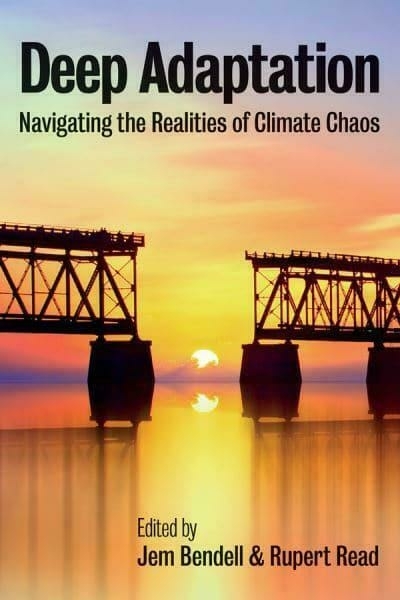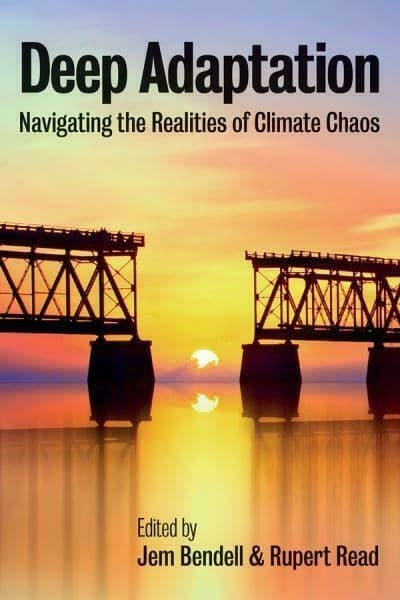The ideology of e-s-c-a-p-e

Taken from Jem Bendell's chapter ‘Deeper Implications of Societal Collapse: Co-liberation from the Ideology of E-s-c-a-p-e’ in the new book Deep Adaptation: Navigating the Realities of Climate Chaos, edited by Jem Bendell and Rupert Read.
The chapter is an auto-ethnographic one where Bendell examines his own assumptions and motivations for writing.
Entitlement involves thinking, 'I expect more of what I like and to be helped to feel fine.'
Surety involves thinking, 'I will define you and everything in my experience, so I feel calmer.'
Control involves thinking, 'I will try to impose on you and everything, including myself, so I feel safer.'
Autonomy involves thinking and feeling, 'I must be completely separate in my mind and being because otherwise I would not exist.'
Progress involves thinking and feeling, 'The future must contain a legacy from me, or make sense to me now, because if not, when I die, I would die even more.'
Exceptionalism means assuming, 'I am annoyed in this world because much about it upsets me and so I believe I'm better and/or needed.'
He continues:
To reject the ideology of e-s-c-a-p-e is to have little place in public discourse today. That is not by accident. The ideology of e-s-c-a-p-e has been conducive to the rise of certain power relations which are embedded in capitalism and all political systems. That ideology is reproduced and spreads through those economic and political systems. There is a relationship between material contexts and the deep rules or 'operating systems' of all societies and economies, on the one hand, and the ideologies that become widespread on teh other. You may recall that Karl Marx once wrote about how the 'mode of production' of goods and services incentivizes certain ways of understanding oneself, the world and society (Cole 2007). It is clear that the 'mode of transaction and consumption' is as important as the mode of production for how we understand ourselves and the world. There is an iterative relationship between material contexts on the one hand and ideas about self and society on the other, especially when those ideas reshape what is considered (or is possible to experience as) a material resource.
Cultural complexes contributing to the climate crisis

Taken from Adrian Tait's chapter 'Climate Psychology and Its Relevance to Deep Adaptation' in the new book Deep Adaptation: Navigating the Realities of Climate Chaos, edited by Jem Bendell and Rupert Read.
What I like about it is that it cuts to the root of much of what is wrong with western societies — the symptom of which is the climate crisis.
(i) the assumption that value is determined by monetary wealth and the monetization of everything;
(ii) the consumerist paradigm of well-being, in which desire for sex, status and fantasies of security are exploited. One example is the current book in sport utility vehicle (SUV) sales, obliterating the emissions savings due to electrification of transport;
(iii) the 'no such thing as society' trope which defines us as isolates rater than members of a collective. The myth is one of liberation and motivation, but its main effect is to dehumanize;
(iv) the generalized belief that competition rather than cooperation is the natural condition for humanity and the main driver of progress. Competitive sport often (but not always) reinforces this;
(v) the 'culture of uncare', as outlined by Sally Weintrobe;
(vi) entitlement — the notion that we are not just special but at complete liberty to dominate, exploit and destroy. This myth has some religious underpinnings. It is also a close relative of colonialism. Entitlement includes expansion and incursion — a prime factor in zoonotic diseases like Covid-19 (Tait 2020);
(vii) species autonomy — the delusion that, with our brilliance, ingenuity, technology and built environment, we have created the world, a bubble in which we're above wider nature, rather than being dependent on the natural world in myriad ways.
Maplessness
The academic paper that this blog post by Katie Carr is based on is also well worth a read - particularly around countering the e-s-c-a-p-e ideology (entitlement, surety, control, autonomy, progress, and exceptionalism).
Maps can be a useful tool, but are neither true to the complexity of any landscape, nor free from assumptions about how to engage with a landscape. They can create an illusion of safety through the sense of being in ‘chartered territory’. They condition us to take notice of certain features and ignore others. Road, footpaths, streams and boundaries are included, but not the smells, sounds, and emotional responses to a landscape. They focus on unchanging landscape features, not the seasonal migration of birds, changing colours, or the life and death that inhabits every place. Although a map is never the territory, and a model not the reality, the implicit suggestion of both maps and models is that to map is to measure and name in order to know, and that to know is to control. The trend towards ever greater mapping and detailed measuring of our infinitely complex and changing world reflects the aim, since the Enlightenment, to attain a sense of safety through protecting ourselves from the mysterious. And the history of cartography is insidiously entangled with colonialism and global injustice. The mapping impulse is therefore an expression of what the DA initiator Jem Bendell has called the ideology of e-s-c-a-p-e. Likewise, the emphasis on carrying out ever more detailed research and analysis as a response to growing evidence of the catastrophe unfolding around us can be seen as a habit – even an addiction – for coping with feelings of extreme vulnerability.Source: The urgent need to slow down: ‘maplessness’ for responding to collapse – Professor Jem Bendell
